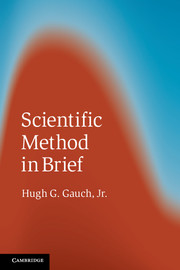Book contents
- Frontmatter
- Contents
- Foreword
- Preface
- 1 Introduction
- 2 Four bold claims
- 3 A brief history of truth
- 4 Science's contested rationality
- 5 Science's presuppositions
- 6 Science's powers and limits
- 7 Deductive logic
- 8 Probability
- 9 Inductive logic and statistics
- 10 Parsimony and efficiency
- 11 Case studies
- 12 Ethics and responsibilities
- 13 Science education
- 14 Conclusions
- References
- Index
4 - Science's contested rationality
Published online by Cambridge University Press: 05 November 2012
- Frontmatter
- Contents
- Foreword
- Preface
- 1 Introduction
- 2 Four bold claims
- 3 A brief history of truth
- 4 Science's contested rationality
- 5 Science's presuppositions
- 6 Science's powers and limits
- 7 Deductive logic
- 8 Probability
- 9 Inductive logic and statistics
- 10 Parsimony and efficiency
- 11 Case studies
- 12 Ethics and responsibilities
- 13 Science education
- 14 Conclusions
- References
- Index
Summary
Does science have a rational method of inquiry that provides humans with a considerable amount of objective truth about physical reality? Certainly, a reply of “yes” represents the traditional claims of mainstream science, as delineated in Chapter 2. Furthermore, anyone who confidently believed the scientific story in Chapter 3 that water is H2O has given every appearance of being in the camp that replies “yes” to this question.
Nevertheless, a controversy has raged over science's claims of rationality and truth, especially in the 1990s, although with roots going back to the 1960s and even back into antiquity. This controversy had such intensity in the 1990s that it went by the name of the science wars” and even made the front pages of the world's leading newspapers.
Views that directly contradict and intentionally erode mainstream science are this chapter’s topic. In this book that explicitly and repeatedly aligns with mainstream science, why devote a whole chapter to these contrary positions? Two reasons may be suggested.
First, for better or for worse, attacks on science’s rationality have substantial cultural influence. The specific arguments and inflammatory rhetoric of “science wars” quickly came and went in a mere decade, which is quite ephemeral in the grand sweep of history, but skeptical and relativistic attacks on truth are perennial features of intellectual history. So, attacks on science’s rationality are too influential and persistent to be ignored.
Information
- Type
- Chapter
- Information
- Scientific Method in Brief , pp. 53 - 72Publisher: Cambridge University PressPrint publication year: 2012
